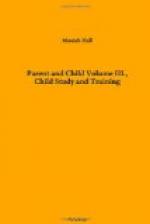It is impossible to say which of the three phases develops first in the infant, nor is it important to know; the significant fact is that all three evolve together, and whenever activity is strong and well sustained, it is evident that feeling and knowing also are well developed.
When the child is two years of age or over, as above remarked, usually an appalling desire to destroy things is manifested. Dolls will be torn to pieces, the toy bank smashed, and if a hammer can be had, nothing is too sacred to be knocked to pieces. This is not depravity in the child, much as it seems to be, it is a legitimate desire to investigate, to satisfy his curiosity, and to find a means of satisfying his increasing power to do something. Up to this time an object is to the child merely the activity for which it stands; a ball is something to roll or toss, a hammer is to strike with, and it is a matter of supreme indifference to him what is struck. At this stage the child has no sense of values and he cannot possibly know that one object may be hit with a hammer, while another object, such as a mirror, may not. He must be taught this fact; at first it is entirely beyond his experience.
But the child now has considerable capacity for knowing, hence the wise parent can easily and quickly teach him to discriminate and even to be careful to avoid injury to certain objects. No attempt should be made to suppress this new-born power of this searcher after truth; this instinct is the basis of invention and of scientific research; it must be properly guided, but not subdued. Give him playthings which can be taken to pieces and put together, dolls which can be dressed and undressed, horses which can be harnessed and fastened to carts, blocks which can be built into various forms, and above all, for a boy, a large, soft block of wood with plenty of nails, tacks, and a hammer. The amount of energy he will expend in filling the block with tacks or nails is astonishing. Other appropriate ways of expressing his energy should also be provided. Give the child something to do.
This rule ought to be rigidly observed: Never cut straight across the activity of a child, but always substitute some other act in place of the one not desired.
LESSON XII
QUESTIONS FOR DISCUSSION
1. How is the great instinct of curiosity at first manifested?
2. What three phases of consciousness are there? How do these develop?
3. What is meant by a well-trained mind?
4. What explains the child’s tendency to destroy things? How may this tendency be best overcome?
5. What rule should the parent carefully follow with relation to the child’s activity?
6. What are some sensible activities that may be easily provided for children?
7. Why is it worth while for parents to devote some time, or even money, to providing for the natural activities of children to express themselves in the right ways?




